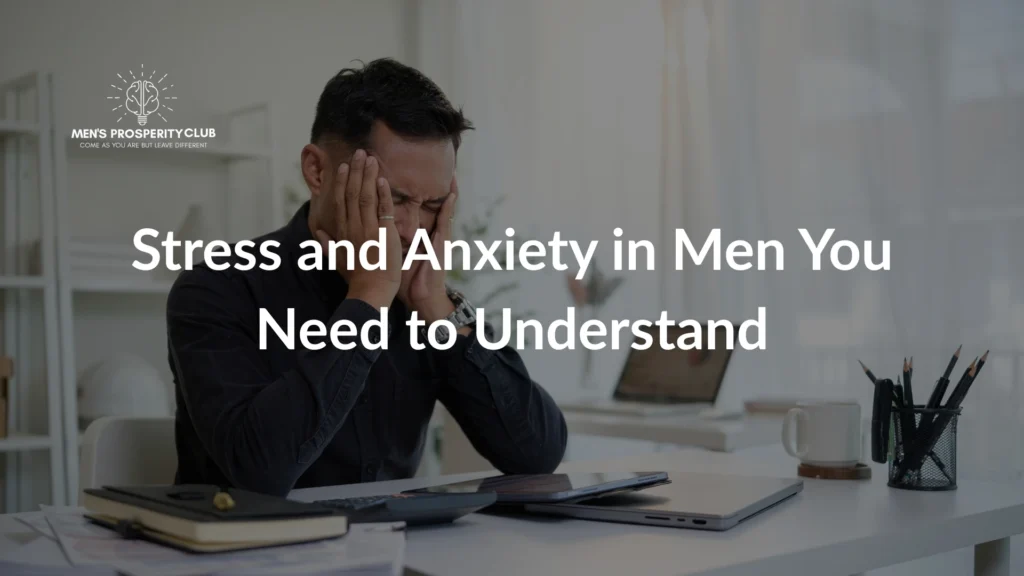Stress doesn’t discriminate, yet blokes across the UK are facing a silent crisis that many feel unable to discuss. Recent data paints a concerning picture: 77% of men have experienced symptoms of common mental health conditions like anxiety, stress, or depression, whilst 40% have never spoken to anyone about their mental health. That’s nearly half of all men carrying their burdens alone, trapped by outdated expectations of what it means to be masculine.
Picture this: you’re lying awake at 3am, mind racing through tomorrow’s work presentation, the mortgage payment, your partner’s worried glances. Your chest feels tight, and you brush it off as “just tiredness”. Sound familiar? You’re not alone. The reality is that modern life throws countless challenges at men, and pretending everything’s fine simply isn’t working anymore.
The Hidden Weight Men Carry
Stress manifests differently in men, often masked by behaviours society deems acceptable. Rather than expressing worry or sadness, many blokes turn to anger, irritability, or withdrawal. They work longer hours, hit the gym obsessively, or reach for another pint. Meanwhile, the pressure builds like steam in a kettle with no release valve.
The numbers tell a stark story. Almost three-quarters of adults (74%) have felt so stressed over the past year that they felt overwhelmed or unable to cope. Whilst women are statistically more likely to be diagnosed with anxiety disorders, the gap narrows when we consider how many men suffer in silence, never seeking help or admitting their struggles.
Consider the workplace, where many men spend the majority of their waking hours. Around 17 million working days are lost every year globally because of ill-health caused by work stress, depression or anxiety. That’s not just a statistic – it represents millions of individuals pushing through until they simply can’t anymore.
Why Talking Feels So Difficult
Let’s address the elephant in the room. 29% of men say they’re “too embarrassed” to speak about their mental health, whilst 20% cite “negative stigma” as the barrier. From childhood, many boys learn that expressing vulnerability equals weakness. They hear phrases like “man up”, “boys don’t cry”, or “stop being soft” – messages that stick like glue and create emotional armour that becomes harder to remove with each passing year.
This silence comes at a devastating cost. Three-quarters of suicides registered in England and Wales are among men, making suicide the single biggest killer of men under 45. These aren’t just numbers on a page; they’re brothers, fathers, sons and mates who felt they had nowhere to turn.
However, times are changing. More men are recognising that strength isn’t about bottling everything up – it’s about having the courage to be honest about what’s really going on. Organisations like Men’s Prosperity Club (MPC) are creating spaces where blokes can discuss their challenges openly, building communities where vulnerability becomes a shared experience rather than a source of shame.
Recognising the Warning Signs
Stress and anxiety don’t always announce themselves clearly. Sometimes they wear clever disguises. You might notice physical symptoms first: persistent headaches, muscle tension, stomach problems, or that constant feeling of fatigue no amount of sleep seems to fix. Perhaps you’re snapping at your kids over minor things, or you’ve lost interest in activities you once loved.
Sleep often takes the first hit. You’re exhausted but can’t switch your brain off. Or you’re sleeping fine but wake up feeling drained. Your appetite might change dramatically – either eating everything in sight or finding food unappealing. Some men report feeling disconnected, as though they’re going through the motions whilst their mind remains elsewhere.
Work performance typically suffers too. Concentration becomes difficult, decisions feel overwhelming, and tasks that once seemed straightforward now feel mountainous. You might find yourself making mistakes you wouldn’t normally make, or avoiding responsibilities altogether.
Importantly, anxiety doesn’t always feel like nervousness. For many men, it manifests as restlessness, irritability, or a constant sense of impending doom. That nagging feeling that something bad is about to happen, even when everything appears fine on the surface.

What’s Actually Causing This Crisis?
Understanding what triggers stress helps us tackle it effectively. The most significant stress triggers by far are money (39%), not enough sleep (39%), health (35%), and family concerns. Financial pressure particularly weighs heavy, especially as living costs continue rising whilst wages struggle to keep pace.
The pandemic fundamentally changed how we work and live. Remote working blurred the boundaries between professional and personal life, leaving many feeling perpetually “on”. Social isolation increased, traditional support networks weakened, and uncertainty became the new normal.
Social media adds another layer of pressure. Endless scrolling reveals other people’s highlight reels – successful careers, perfect families, enviable lifestyles. It’s easy to forget these represent carefully curated moments rather than reality, leaving many feeling inadequate by comparison.
Relationship pressures shouldn’t be overlooked either. Whether it’s romantic partnerships, family dynamics, or friendships, navigating human connections requires emotional energy. When you’re already stretched thin, even minor conflicts can feel catastrophic.
Practical Steps Towards Better Mental Health
Right, enough about the problems – let’s talk about solutions. The good news is that stress and anxiety are manageable once you start taking action. Small changes often create significant impacts.
Start by talking. Seriously. Find someone you trust – a mate, family member, or professional – and open up about what’s happening. MPC offers support groups specifically designed for men, providing safe environments where you can share experiences without judgement. Sometimes simply voicing your concerns aloud removes their power over you.
Physical activity works wonders for mental health. You don’t need to become a gym fanatic; a daily walk counts. Exercise releases endorphins, provides time for reflection, and helps process stress that accumulates in your body. Many blokes find that physical activity offers a socially acceptable outlet for emotions they struggle to express verbally.
Sleep hygiene matters more than most people realise. Establish a consistent bedtime routine, limit screen time before bed, and create a comfortable sleeping environment. Not enough sleep ranks as one of the top stress triggers, creating a vicious cycle where stress disrupts sleep, which increases stress further.
Mindfulness and meditation aren’t just trendy buzzwords – they’re evidence-based tools for managing anxiety. Apps like Headspace or Calm offer guided sessions specifically designed for beginners. Even five minutes of focused breathing daily can make a measurable difference.
Consider your relationship with alcohol. 29% of people who felt stressed reported starting drinking or increasing their alcohol consumption. Whilst a pint might provide temporary relief, alcohol ultimately worsens anxiety and disrupts sleep quality. Finding healthier coping mechanisms pays dividends long-term.
Building Your Support Network
No man is an island, despite what society sometimes suggests. Building meaningful connections provides both practical support and emotional resilience. This doesn’t mean you need dozens of friends – quality matters more than quantity.
Men’s groups like MPC create opportunities to connect with others facing similar challenges. These spaces allow genuine conversations about real issues, from work stress to relationship troubles, without the usual masculine bravado. Discovering that other blokes share your struggles reduces isolation and normalises seeking help.
Don’t underestimate existing relationships either. That mate you play football with or grab coffee with? They might be experiencing similar stress. Opening up could deepen your friendship whilst providing mutual support. Many men report that once they start talking honestly, others reciprocate with their own struggles.
Professional support remains invaluable. Therapists and counsellors offer objective perspectives and evidence-based strategies tailored to your specific situation. The NHS provides various talking therapies, whilst private options exist for those who prefer them. There’s no shame in seeking professional help – it’s simply using available resources intelligently.

When to Seek Professional Help
Sometimes self-help isn’t enough, and that’s perfectly okay. Recognising when you need additional support demonstrates wisdom, not weakness. Consider reaching out to your GP or a mental health professional if:
Your symptoms persist despite trying various coping strategies. Stress and anxiety that continue for weeks or months without improvement warrant professional attention. Mental health conditions are medical issues requiring appropriate treatment, just like any physical illness.
Your daily functioning is significantly impaired. If you’re struggling to maintain relationships, perform at work, or handle basic responsibilities, professional intervention can help get you back on track.
You’re experiencing thoughts of self-harm or suicide. This requires immediate attention. Contact the Samaritans on 116 123 (available 24/7) or present yourself at A&E. These thoughts indicate serious distress that professionals can help address.
Your physical health is suffering. Chronic stress manifests physically, potentially causing or exacerbating various health conditions. If you’re experiencing persistent physical symptoms, discuss them with your doctor.
Moving Forward With Hope
Here’s the truth: addressing stress and anxiety takes courage, but it’s absolutely possible. Thousands of men across the UK are reclaiming their mental health, learning to navigate life’s challenges without sacrificing their wellbeing. You can too.
One in seven people in the UK say their mental health is bad or even the worst it has ever been, highlighting that you’re far from alone in this struggle. However, awareness is growing, resources are expanding, and conversations are becoming easier.
The journey towards better mental health isn’t linear. Some days will feel harder than others. Progress might involve two steps forward and one step back. That’s normal and expected. What matters is maintaining forward momentum, even when it’s just a small shuffle.
Communities like Men’s Prosperity Club are actively working to change the narrative around men’s mental health. They’re proving that vulnerability and masculinity aren’t opposites – they’re complementary. Real strength involves acknowledging when you’re struggling and taking steps to address it.
Remember, seeking help doesn’t make you weak – it makes you human. Every man who speaks up makes it easier for the next bloke to do the same. By addressing your stress and anxiety, you’re not just improving your own life; you’re contributing to a cultural shift that benefits all men.
Take that first step today, whether it’s talking to someone you trust, joining a support group like MPC, or simply acknowledging to yourself that things aren’t okay. Your mental health matters, your struggles are valid, and support is available. You don’t have to carry this weight alone anymore.




